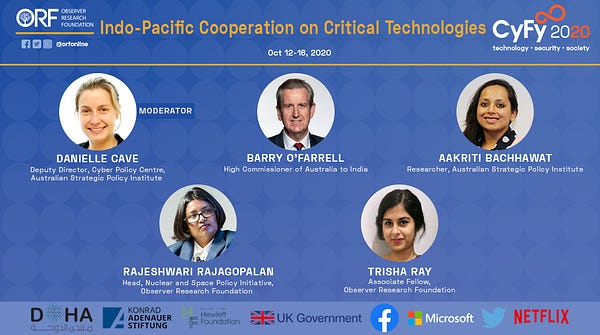New report: The flipside of China's central bank digital currency | Nakasone, commander of US cyber army | Facebook bans anti-vaxxer ads


Follow us on Twitter. The Daily Cyber Digest focuses on the topics we work on, including cyber, critical technologies & strategic issues like foreign interference.
China’s central bank digital currency, known as ‘DC/EP’ (Digital Currency / Electronic Payment), is rapidly progressing and, if successful, would have major international implications that have not yet been widely considered by policymakers. It has the potential to create the world’s largest centralised repository of financial transactions data and, while it may address some financial governance challenges, such as money laundering, it would also create unprecedented opportunities for surveillance. The initial impact of a successful DC/EP project will be primarily domestic, but little thought has been given to the longer term and global implications. ASPI ICPC
Nakasone's offensive cyber strategy, which was developed under the eye of Trump's former national security adviser John Bolton, represents a paradigm shift in how the US confronts its adversaries online. Rather than waiting to respond to an attack, Nakasone and US Cyber Command have shifted to talk of “persistent engagement,” “defending forward,” and “hunting forward,” amorphous terms that encompass everything from mounting digital assaults on ISIS and Iran's air defense systems to laying the groundwork for taking down Russia's electrical grid. WIRED
Facebook on Tuesday said it would no longer allow anti-vaccination ads on its platform, in another reversal of its longtime stance of avoiding being the referee on thorny issues. The New York Times
ASPI ICPC
New report: The flipside of China's central bank digital currency
ASPI ICPC
China’s central bank digital currency, known as ‘DC/EP’ (Digital Currency / Electronic Payment), is rapidly progressing and, if successful, would have major international implications that have not yet been widely considered by policymakers. DC/EP would have ramifications for governments, investors, and companies, including China’s own tech champions. It has the potential to create the world’s largest centralised repository of financial transactions data and, while it may address some financial governance challenges, such as money laundering, it would also create unprecedented opportunities for surveillance. The initial impact of a successful DC/EP project will be primarily domestic, but little thought has been given to the longer term and global implications.




China’s Quiet Experiment Let Millions View Long-Banned Websites
Bloomberg
“This latest development with Tuber is interesting because it could be seen as more openness,” said Fergus Ryan, a researcher at the Australian Strategic Policy Institute. “But the way that it would actually work would mean that people who use it would be highly surveilled and the information that they are able to access via this platform is filtered by the censorship apparatus.”


World
Sacha Baron Cohen: We Must Save Democracy From Conspiracies
Time
A year ago, I spoke out publicly for the first time in my own voice because I feared that our pluralistic democracies were at risk of being destroyed by a flood of hate, lies and conspiracies spewed by demagogues and spread by social media. Since then, this toxic brew has exploded into the open and—with just weeks until the election—these conspiracies threaten to kill democracy as we know it.
To mend a broken internet, create online parks
WIRED
@elipariser
We need public spaces, built in the spirit of Walt Whitman, that allow us to gather, communicate, and share in something bigger than ourselves.
Australia
Australia’s home affairs secretary says state security must be 'ubiquitous without being oppressive'
The Guardian
@murpharoo
The threat of cyber attacks, he said, illustrated the case in point “that security has to be designed into societal structures, institutions and systems”. Security extended beyond government and was “generated through the whole of society, with government leading and guiding through a networked partnership with the rest of society”.
Spotless hit by cyber attack
The Australian
@swan_legend @chris_griffith
Cleaning services outfit Spotless has been hit by a cyber attack, with the company forced to shut down much of its IT services.
Cyber criminals renting out their malware, expert warns
The Australian Financial Review
International cyber criminals have embraced a "franchise" model and are selling malware to other attackers who then target businesses and individuals demanding ransom payments, the Morrison government's top cyber security adviser says.


China
Chinese regulatory probe delays approval for Ant's IPO, sources say
Reuters
China’s securities regulator is probing a potential conflict of interest in fintech giant Ant Group’s planned $35 billion stock listing, delaying approval for what could be the world’s largest IPO, three people with direct knowledge of the matter said.
Huawei's base station teardown shows dependence on US-made parts
Nikkei
Huawei Technologies still remains heavily dependent on U.S.-made chips and components for manufacturing equipment for 5G telecom base stations, a leading revenue source for the Chinese tech giant, while being battered by the fierce fight between America and China over who controls the technologies of the future.
USA
The Man Who Speaks Softly—and Commands a Big Cyber Army
WIRED
Nakasone's offensive cyber strategy, which was developed under the eye of Trump's former national security adviser John Bolton, represents a paradigm shift in how the US confronts its adversaries online. Rather than waiting to respond to an attack, Nakasone and US Cyber Command have shifted to talk of “persistent engagement,” “defending forward,” and “hunting forward,” amorphous terms that encompass everything from mounting digital assaults on ISIS and Iran's air defense systems to laying the groundwork for taking down Russia's electrical grid.
Facebook Bans Anti-Vaccination Ads, Clamping Down Again
The New York Times
Facebook on Tuesday said it would no longer allow anti-vaccination ads on its platform, in another reversal of its longtime stance of avoiding being the referee on thorny issues.
Clear Conquered U.S. Airports. Now It Wants to Own Your Entire Digital Identity.
OneZero
Clear’s vision for its fingerprint, iris-scanning, and facial recognition business goes beyond kiosks in airports or sports areas — it wants to be a holistic identity verification platform, covering more intimate moments in our everyday lives. The company has already amassed troves of personal data on its customers, especially for Clear customers who use the service to buy concessions and enter sports stadiums. The company has even explored sharing that data with partners for marketing purposes. In return for cutting to the front of the line unimpeded, customers handing over vast swaths of biometric and travel data.
Portland’s Face-Recognition Ban Is a New Twist on ‘Smart Cities’
WIRED
This month, Portland adopted the nation’s most restrictive laws on face recognition, banning private as well as government use of the technology. The new rules originated in part from a small city office called Smart City PDX that has sought to redefine the buzzword it is named for. Instead of hunting for “smart” new tech, it aims to mediate tech’s impact on citizens. “The focus became the work we need to do before we deploy new technology, especially in BIPOC communities who don’t trust the city to necessarily represent their interests,” says Kevin Martin, who leads Smart City PDX.
Google Employees Are Free to Speak Up. Except on Antitrust.
The New York Times
Google employees are not shy about speaking up. In the last few years, they have openly confronted the company about building a censored search engine in China, the handling of sexual harassment claims and its work with the Pentagon on artificial intelligence technology for weapons. But there is one subject that employees avoid at all costs: antitrust.
Fake Twitter accounts posing as Black Trump supporters appear, reach thousands, then vanish
The Washington Post
An account featuring the image of a Black police officer, President Trump and the words “VOTE REPUBLICAN” had a brief but spectacular run on Twitter. In six days after it became active last week, it tweeted just eight times but garnered 24,000 followers, with its most popular tweet being liked 75,000 times. Then, on Sunday, the account was gone — suspended by Twitter for breaking its rules against platform manipulation.


QAnon is tearing families apart
The Washington Post
Jacob, who grew up in the United States, told The Washington Post that he has cut all contact with his mother now that she’s become an ardent believer of the QAnon conspiracy theories. Though they long held different political beliefs, they had “a really, really strong relationship,” he said. “We were inseparable.” He had no reason to think anything had changed. But during the holidays in 2019, “our relationship just completely tanked.”
UK
'Serious cyberattack' hits London council
ZDNet
Hackney Council in north London says it has been the target of a serious cyberattack, which is affecting many of its services and IT systems. The council said it is working closely with the National Cyber Security Centre, external experts and the Ministry of Housing, Communities and Local Government to investigate and understand the impact of the incident. It's unclear exactly what form the cyberattack has taken or when it took place.
Misc
‘What Tech Calls Thinking’ Might Really Be Something Else
The New York Times
In an erudite new book, “What Tech Calls Thinking,” Adrian Daub, a professor of comparative literature and German studies at Stanford, investigates the concepts in which Silicon Valley is still staked. He argues that the economic upheavals that start there are “made plausible and made to seem inevitable” by these tightly codified marketing strategies he calls “ideals.”
Microsoft and others orchestrate takedown of TrickBot botnet
ZDNet
A coalition of tech companies has announced today a coordinated effort to take down the backend infrastructure of the TrickBot malware botnet. Companies and organizations which participated in the takedown included Microsoft's Defender team, FS-ISAC, ESET, Lumen's Black Lotus Labs, NTT, and Broadcom's cyber-security division Symantec.
Research


Events
Online safety in the Pacific: Report Launch
Eventbrite
Join Chief Executives from Plan International Australia and ChildFund Australia in discussion with expert Professor Amanda Third, Western Sydney University to launch the Online Safety in the Pacific Report. Hear more about children and young people’s online experiences based on research conducted through Living Labs in Kiribati, Papua New Guinea and the Solomon Islands. Our panel will discuss emerging regional challenges, and the programmatic solutions we have developed to keep children and young people safe online.


Jobs
Senior Researcher / Project Lead
ASPI ICPC
ASPI’s International Cyber Policy Centre (ICPC) has an outstanding opportunity for a senior researcher to lead a one-year project looking at leadership networks across Asia. Interviews will start immediately.


